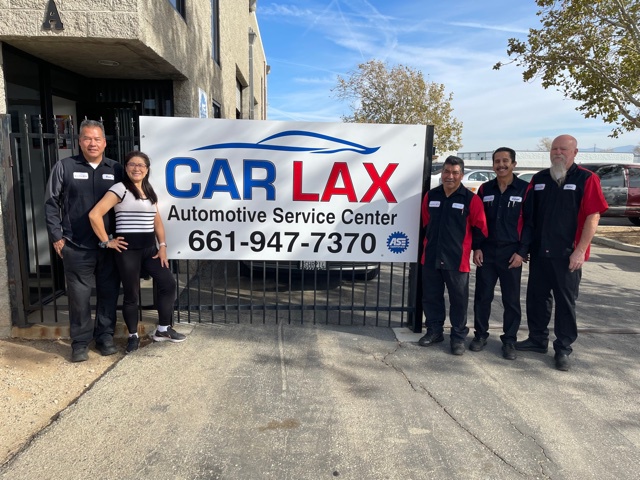When do brakes need to be replaced?
The simple answer is that brake pads, in particular, need to be continually inspected with every service and replaced every 25,000–70,000 miles. However, there are additional factors that go into determining exactly how often you need to have brake work done. You should have your brakes repaired if you see any of the following signs.
Watch Out for These Signs That You Need Brake Replacement
- Swerving and drifting: If your vehicle swerves to the side or takes longer to actually stop when you hit the brakes.
- Odd noises: Grinding noises suggest your pads are gone and the rotors are being damaged, while a squeal means the pads are wearing down.
- Warning lights: Newer vehicles have a light that shows it's time to have your brakes examined.
- Visual damage: You need to have your brake pad replaced if you have less than a quarter of an inch of it left.
- Vibrations: A shaking steering wheel or brake pedal can signal warped rotors.
Balance Your Brake Replacement Frequency With the Following Considerations
- Vehicle type and weight: The heavier your vehicle is, the more strain you put on your brake system when using it, and the more frequent your brake repair will become. A large truck will generally need more frequent brake work than a small car used under the same conditions. So if you're driving a larger vehicle, you'll need to have your brakes looked at more often.
- Your interior and exterior environment: Different driving conditions will take a greater toll on a vehicle's brakes. Schedule maintenance and repair more frequently if you're driving on rough terrain. Likewise, the interior environment, such as added weight, can place additional stress on your brakes
- Advice from the manufacturer: A vehicle's manufacturer should provide information on how often brake service and maintenance should be performed.
- Material considerations: If you have organic brake pads, they'll wear out faster than metallic or ceramic pads.
So, when do brakes need to be replaced? Better safe than sorry when it comes to brake repair. The main reason for erring on the side of caution is that your brakes are synonymous with vehicular safety. Brake failure is a major threat to your security and that of your loved ones. However, there's also a monetary angle. Brake replacement and repair at a safe and convenient time is far less expensive than if you waited for the damage to escalate. More frequent lower-scale work is always more cost-effective than larger-scale repairs done less frequently. You should have your brake pads replaced every 25,000 to 70,000 miles, with extra consideration for the previously mentioned factors.
Need to know when do brakes need to be replaced? Contact our ASE-certified technicians at Carlax Quality Automotive for more information about our brake repair and to schedule an appointment. Our auto shop serves vehicle owners in Palmdale, CA, and the surrounding areas.

The simple answer is that brake pads, in particular, need to be continually inspected with every service and replaced every 25,000–70,000 miles. However, there are additional factors that go into determining exactly how often you need to have brake work done. You should have your brakes repaired if you see any of the following signs.
Watch Out for These Signs That You Need Brake Replacement
- Swerving and drifting: If your vehicle swerves to the side or takes longer to actually stop when you hit the brakes.
- Odd noises: Grinding noises suggest your pads are gone and the rotors are being damaged, while a squeal means the pads are wearing down.
- Warning lights: Newer vehicles have a light that shows it's time to have your brakes examined.
- Visual damage: You need to have your brake pad replaced if you have less than a quarter of an inch of it left.
- Vibrations: A shaking steering wheel or brake pedal can signal warped rotors.
Balance Your Brake Replacement Frequency With the Following Considerations
- Vehicle type and weight: The heavier your vehicle is, the more strain you put on your brake system when using it, and the more frequent your brake repair will become. A large truck will generally need more frequent brake work than a small car used under the same conditions. So if you're driving a larger vehicle, you'll need to have your brakes looked at more often.
- Your interior and exterior environment: Different driving conditions will take a greater toll on a vehicle's brakes. Schedule maintenance and repair more frequently if you're driving on rough terrain. Likewise, the interior environment, such as added weight, can place additional stress on your brakes
- Advice from the manufacturer: A vehicle's manufacturer should provide information on how often brake service and maintenance should be performed.
- Material considerations: If you have organic brake pads, they'll wear out faster than metallic or ceramic pads.
So, when do brakes need to be replaced? Better safe than sorry when it comes to brake repair. The main reason for erring on the side of caution is that your brakes are synonymous with vehicular safety. Brake failure is a major threat to your security and that of your loved ones. However, there's also a monetary angle. Brake replacement and repair at a safe and convenient time is far less expensive than if you waited for the damage to escalate. More frequent lower-scale work is always more cost-effective than larger-scale repairs done less frequently. You should have your brake pads replaced every 25,000 to 70,000 miles, with extra consideration for the previously mentioned factors.
Need to know when do brakes need to be replaced? Contact our ASE-certified technicians at Carlax Quality Automotive for more information about our brake repair and to schedule an appointment. Our auto shop serves vehicle owners in Palmdale, CA, and the surrounding areas.



